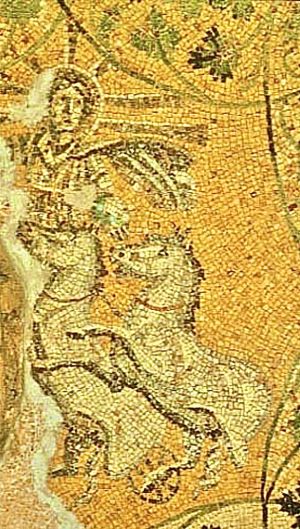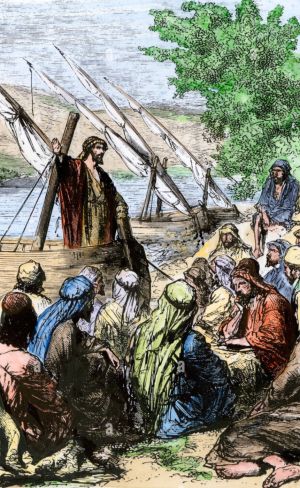
don Giuseppe Nespeca
Giuseppe Nespeca è architetto e sacerdote. Cultore della Sacra scrittura è autore della raccolta "Due Fuochi due Vie - Religione e Fede, Vangeli e Tao"; coautore del libro "Dialogo e Solstizio".
Being saved
Being saved does not mean merely escaping punishment but being delivered from the evil that dwells within us. It is not punishment that must be eliminated but sin, the rejection of God and of love which already bears the punishment in itself.
The Prophet Jeremiah was to say to the rebellious people: “Your wickedness will chasten you, and your apostasy will reprove you. Know and see that it is evil and bitter for you to forsake the Lord your God” (Jer 2:19).
It is from this sorrow and bitterness that the Lord wishes to save man, liberating him from sin. Therefore, however, a transformation from within is necessary, some foothold of of goodness, a beginning from which to start out in order to change evil into good, hatred into love, revenge into forgiveness..
[Pope Benedict, General Audience 18 May 2011]
Declining missionary drive: crisis of Faith
2. The Council has already borne much fruit in the realm of missionary activity. There has been an increase of local churches with their own bishops, clergy and workers in the apostolate. The presence of Christian communities is more evident in the life of nations, and communion between the churches has led to a lively exchange of spiritual benefits and gifts. The commitment of the laity to the work of evangelization is changing ecclesial life, while particular churches are more willing to meet with the members of other Christian churches and other religions, and to enter into dialogue and cooperation with them. Above all, there is a new awareness that missionary activity is a matter for all Christians, for all dioceses and parishes, Church institutions and associations.
Nevertheless, in this "new springtime" of Christianity there is an undeniable negative tendency, and the present document is meant to help overcome it. Missionary activity specifically directed "to the nations" (ad gentes) appears to be waning, and this tendency is certainly not in line with the directives of the Council and of subsequent statements of the Magisterium. Difficulties both internal and external have weakened the Church's missionary thrust toward non-Christians, a fact which must arouse concern among all who believe in Christ. For in the Church's history, missionary drive has always been a sign of vitality, just as its lessening is a sign of a crisis of faith.
[Pope John Paul II, Redemptoris Missio]
Other Creation
God is always at work out of love and it is up to us to respond to him with responsibility and in a spirit of reconciliation, leaving room for the Holy Spirit. This was the invitation addressed by the Pope in the Mass celebrated Monday morning, 9 February, in the chapel of the Casa Santa Marta.
"Today's liturgy of the Word," Francis explained immediately, referring to the passage from Genesis (1:1-19), "leads us to think, to meditate on God's workings: God works". So much so that "Jesus himself said: 'My Father still works, still acts, still works; me too!". And so, the Pope recalled, "some medieval theologians explained: first God, the Creator, creates the universe, creates the heavens, the earth, the living. He creates. The work of creation'. However, 'creation does not end: He continually sustains what He has created, He works to sustain what He has created so that it goes on'.
Precisely in Mark's Gospel (6:53-56), the Pope noted, "we see God's 'other creation'" that is, "that of Jesus who comes to 're-create' what had been ruined by sin". And "we see Jesus among the people". In fact, Mark writes: "When he got out of the boat, the people immediately recognised him and flocked from all over the region and began to bring the sick to him on stretchers, wherever they heard he was; and those who touched him were saved". It is "the 're-creation'", precisely, and "the liturgy expresses the soul of the Church in this, when it makes us say in a beautiful prayer: 'Oh God, who so marvellously created the universe, but more marvellously recreated it in redemption'". So 'this "second creation" is more wonderful than the first, this second work is more wonderful'.
There is then, Francis continued, "another work: the work of perseverance in the faith, which Jesus says is done by the Holy Spirit: 'I will send you the Paraclete and He will teach you and make you remember what I have said'". It is "the work of the Spirit within us, to make Jesus' word alive, to preserve creation, to ensure that this creation does not fail". So "the presence of the Spirit there, making the first creation and the second creation alive".
In short, 'God works, continues to work, and we can ask ourselves how we are to respond to this creation of God, which was born out of love because He works out of love'. Thus "to the 'first creation' we must respond with the responsibility that the Lord gives us: 'The earth is yours, bring it forth; make it grow!'". Therefore "for us too there is the responsibility to make the earth grow, to make creation grow, to guard it and make it grow according to its laws: we are lords of creation, not masters". And we must not 'take possession of creation, but make it grow, faithful to its laws'. Precisely "this is the first response to God's work: to work to care for creation, to make it bear fruit".
In this perspective, the Pope argued, 'when we hear that people hold meetings to think about how to guard creation, we can say: "But no, it's the greens!"'. Instead, he relaunched, "it is not the greens: this is Christian!". And "it is our response to God's 'first creation', it is our responsibility!". In fact, "a Christian who does not care for creation, who does not make it grow, is a Christian who does not care for God's work, that work born of God's love for us". And "this is the first response to the first creation: to guard creation, to make it grow".
But "to the 'second creation', how do we respond?" asked Francis, noting that, in this regard, "the Apostle Paul tells us a right word, which is the true response: 'Let yourselves be reconciled with God'". It is, he explained, 'that open interior attitude to go continuously on the road of interior reconciliation, of communal reconciliation, because reconciliation is the work of Christ'. And Paul goes on to say: 'God has reconciled the world in Christ'. And "this is the second answer". So "to the 'second creation' we say: 'Yes, we must allow ourselves to be reconciled with the Lord'".
Francis then proposed another question: "And to the work that the Holy Spirit does in us, of reminding us of Jesus' words, of explaining to us, of making us understand what Jesus said, how do we respond?" It was "Paul who told us" not to grieve "the Holy Spirit who is in you: be careful, he is your host, he is within you, he is working within you! Do not grieve the Holy Spirit". And this "because we believe in a personal God. God is person: he is person Father, person Son and person Holy Spirit'. Moreover, "all three are involved in this creation, in this recreation, in this perseverance in re-creation". So "to all three we respond: to guard and make creation grow, let us be reconciled with Jesus, with God in Jesus, in Christ, every day, and do not grieve the Holy Spirit, do not chase him away: he is the guest of our heart, the one who accompanies us, who makes us grow".
In conclusion, the Pope prayed that "the Lord will give us the grace to understand that He is at work; and give us the grace to respond rightly to this work of love."
[Pope Francis, St. Martha, in L'Osservatore Romano 10/02/2015]
Salt and Light in Vocation
(Mt 5:13-16)
«Beautiful Works» [which express fullness] are good works, enriched by the splendour of disinterest, listening, hospitality, prayer and humble dialogue, cordial fraternity.
The plural term (v.16) indicates our vocation to reinterpret in a personal way the Self-Portrait of Christ imprinted in the Beatitudes just proclaimed (vv.1-12).
We each have an irreplaceable role in the moments of equilibrium break and Exodus.
We are legitimized unconditionally.
God has respect for the shortcomings and the functions that are lacking: who knows what blissful novelties they hide and are preparing.
The Beatitudes have their own fragrance, but all personal. Their «salt» fights the insignificant of fatuous hopes.
And sons look far away, but they are with the "pasta"... remaining a living call: between God and man [who is himself even in fraternity] there is an inviolable bond.
In fact, «Light» is what doesn’t mix with things, but distinguishes them.
The Israelites considered themselves «Light of the world» for their devotion and impeccable religious practice.
For Jesus, the faithful and the Community are «Light» because they walk in the friendly glory of the Master.
The disciple and the Assembly are «Salt» because they appear in the world under any circumstance as those who give it meaning, Wisdom [from the Latin «sapĕre», to have flavour].
We are called to be a sign of a new Pact, because the unexpected Relation of the Mount that the Son proposes could no longer be contained in the First Covenant.
To the ancient needs of purification Christ replaces those of full fraternity, which in the enhancement of each person gives taste and (precisely) flavor, and becomes a lamp to our steps.
This "second Pact" doesn’t crush the believing people. Sign of a Father who recovers and infuses orientations to the individual path and to the Churches - not from the outside, but from our roots and as a leaven.
We become a living Beauty thanks to an activity that is imperfect but that has its influence on flowering, from within.
Thus preserving people from the unraveling of dehumanization and corruption - like «salt» with food.
«Salt and Light» are every little divine element that has its own Mystery and Appeal.
Our little candles can continue to thin out the darkness, but only until we put them under a «bushel» (v.15), that is, under a pedissee «measure» - wich is not the different, propulsive and always unprecedent one of the Beatitudes.
In Christ we are led to an evolutionary leap: we are Sapidity though minute of things, and limited Lights, yes - but not inhibited.
The life of Faith guides and stimulates the building of a realm of personal Taste and Love, without hysteria or intimate dissociations.
This adventure is configured as a New Alliance between soul, reality, global and local world, signs of time and Mystery.
Light of Freedom that coincides with our Vocation by Name. Intelligent energy that knows how to draw alternative life even from the wounds inflicted.
[5th Sunday in O.T. (year A) February 8, 2026]
Salt and Light in Vocation
Fullness of minimal and beautiful works, not small and insignificant
(Mt 5:13-16)
"Beautiful works" [which express fullness] are good works, enriched by the splendour of selflessness, listening, hospitality, humble prayer and dialogue, and cordial fraternity.
The plural term (v. 16) indicates - beyond abilities and circumstances - our vocation to reinterpret in a personal way the Self-Portrait of Christ imprinted in the Beatitudes just proclaimed (vv. 1-12).
The theme of the passage is that of fidelity, which integrates and overcomes inconstancy - and the need to seal love with risk, which makes us authentic [last Beatitude: vv.10-12].
The Lord has a surprising trust, because his Plan is to become the flavour and fundamental orientation of human history - not only 'in favour of all', but for each individual (even those considered insignificant).
Of course, only Jesus is the liturgical Amen: the icon of fulfilled humanity, consistency of dedication, the Yes and the finality of the Promises.
But his story has always been contrary to the current mentality.
Therefore, even we - perhaps 'seen' as inadequate - can embody a path where the Gospel arises not only as something common, and therefore 'halfway'.
We each have an irreplaceable role in moments of disruption and Exodus.
We are legitimised without conditions.
God has respect for shortcomings and missing functions: who knows what blessed novelties they hide and are preparing.
In his commentary on the Tao (ii), Master Ho-shang Kung states:
'The original ch'i gives life to all creatures and does not appropriate them', that is, it does not go back, it does not confer the old, backward and fixed order. It does not run for cover; rather, it gives a charge - not partial, but vital and illuminating.
Of course, it is precisely in consumer goods that constant change lies: this confuses the conventional religious idea.
But the fact that our Vocation is: to be and become more and more the Source of Life like the Father, and signs of the Covenant between Heaven and earth (with equal dignity to the Son) values every small divine element in us, or that we promote in our brothers and sisters.
We cannot escape our essence, and we do so with passion - not out of an iron will to 'be' 'salt' and 'light' according to opinion.
So, instead of yearning to return to functioning like everyone else or as before, we will begin to respect our own and others' retreats of the soul.
In its pauses and questions of meaning, it is nurturing the future of the Kingdom.
In Jesus' time, flames were obtained from fats: extinguishing a lamp with a breath meant filling the House with nauseating miasmas.
This is what happens in a voluntarist and inattentive Church, when there is an excess of dirigisme that does not respect the unrepeatable vocational dignity - replaced by manners.
Every blade of grass makes its own distinct contribution to making the field green; this does not mean that it feels constrained - nor can it be extinguished or reduced by a pretentious and ostentatious context that would risk altering it.
The Beatitudes have their own fragrance, but it is entirely personal: it would be futile to attenuate their aroma by adding ordinary cream, which sweetens various dishes (but unifies their peaks). Or candyfloss, more suited to festivals of castagnole, castanets and firecrackers, and variety shows.
Their 'salt' combats the insignificance of vain hopes or those of others (béchamel sauce of appearances). It introduces an internal and savoury wisdom into the world of side dishes, salads, carousels and insipidities.
Children look far away, but they stay with the 'pasta'... remaining a living reminder: between God and man [who is himself even in brotherhood] there is an inviolable bond.
In fact, 'Light' is what does not mix with things, but distinguishes them.
This means that, without too many compliments, spiritual discernment must be wrested from the clutches of those who, out of quietism and in order not to cause annoyance to those complacent with power, mitigate and adapt, indeed hide the Gospel - turning it into a lullaby.
The parallel passage in Luke 11:33 concerns the reception of pagans: to bring 'light' to those who enter the House.
Matthew is primarily concerned with those who already dwell there: whose specific weight and life of relationships based on the conviviality of differences must become Light in itself - to allow everyone to understand the difference between the seeds of death and the paths of complete Life.
The Israelites considered themselves the 'Light of the world' because of their devotion and impeccable religious practice.
A great Roman parish priest told me that one of the things that had struck him on his travels in the USA was seeing too many Catholic citadels on top of hills, clearly visible to the eye but equally clearly equipped with everything - therefore detached, able to provide for themselves, closed to comparison with today's real urban life.
This approach is diametrically opposed to that of many evangelical communities, which are less conspicuous and do not seek to attract people with their external beauty. They are integrated into the fabric of the city and are therefore able to shed light on the daily lives of people seeking a personal and real relationship with God the Father.
For Jesus, the faithful and the community are 'Light' because they walk in the friendly glory of the Master.
He remains the slaughtered Lamb who becomes available food, and does not give the impression of magnificence or clamour; he does not shut himself up in fortresses, nor does he terrorise.
The disciple and the Assembly are 'Salt' because they appear in the world in all circumstances as those who give it meaning, Wisdom [from the Latin sapĕre, to have flavour].
We are called to be a sign of a new Covenant, because the unexpected Relationship of the Mountain that the Son proposes could no longer be contained in the First Covenant.
Christ replaces the ancient demands of purification with those of full brotherhood, which, in valuing each person, gives taste and (precisely) flavour, and becomes a lamp for our steps.
This 'second Covenant' does not crush the believing people.
The inclination to unravel one's own evolution by becoming protagonists in the Name of the New Agreement will transmit illumination and fragrance to the journey.
In this way, we will allow ourselves to be moulded, yielding to our Core that wants to grow, express itself, and give space to the sides that are still in shadow.
Signs of a Father who recovers and instils guidance on the individual path and that of the Churches - not from the outside, but starting from our roots and like a leaven.
We become living Beauty thanks to an activity that is imperfect but has its influence on flowering, from within.
Thus preserving people from the decay of dehumanisation and corruption - like 'salt' with food.
In fact, if not properly understood thanks to the qualitative leap of Faith-love, even religious sense can channel women and men into a thousand streams of cunning...
Towards a decomposition of wisdom, and schematic, disembodied, insipid hastiness - as well as, unfortunately, indistinct fog.
'Salt and Light' are every small divine element already within us. Thus, any effort for beauty, solidity and variety will not be lost - although reduced and diminished: it has its own Mystery and Appeal.
Of course, even in traditional religion, the value of small things is not denied, but they remain small and fixed - without leaps.
In a climate where 'Ne quid nimis' [nothing excessive] prevails, the summary conditions all seem aimed at confirming the system of things and roles.
The cloak of customs weakens the peaks, relegates the personalities of simple people to restricted, insignificant areas, which urge them to invest their energies in vacuous, childish aspects.
The idiocy of certain details is always there, stifling evolution.
In Fede's experience, we do not despise even the smallest contribution to the construction of a Kingdom alternative to the current one - sometimes unifying, but based on nonsense and catwalks in obvious disrepair and stench.
Our candles can continue to dispel the darkness, but only until we place them under a 'bushel' (v.15), that is, until we give up, to put them under a slavish 'measure' - which is not the different, propulsive and always new measure of the Beatitudes.
In Christ, we are guided to an evolutionary leap: we are the minute Savouriness of things, and limited Lights, yes - but not inhibited, nor small and 'baby'.
The life of Faith guides and stimulates the building of a kingdom of personal Flavour and Love, without hysteria or intimate dissociations.
This adventure takes the form of a New Covenant between soul, reality, the global and local world, signs of the times and Mystery.
Light of Freedom that coincides with our Vocation by Name. Intelligent energy that knows how to draw alternative life even from the wounds inflicted.
The salt gone mad of religion without Faith: treating ourselves as sick people
(Mt 5:13)
One of the possible translations from the Greek of the expression in v. 13 [perhaps the most plausible] is: 'if the salt goes mad'.
Why does it go mad? It refers to personal harmony with the divine Covenant that dwells within us and to which we do not want to give space, even though it would be truly fulfilling.
All this because we are accustomed to living and feeding on external attitudes.
The Covenant would like to guide our little boat even in this time of recovery from the tragedies that are blocking the world, but it is made difficult by the recitation of scripts - by what 'must be done' according to previous ideas and routine.
This expression in Matthew 5:13 is the same as that of the 'foolish' man (Mt 7:26) who builds his house not on the Rock [of Freedom, which coincides with his Calling].
He also 'builds' ostentatious realities, but on unstable elements that we sometimes see as fragile, lacking in substance - therefore without a solid foundation. Rather, they are a reflection of handed-down thoughts, or of calculation and fantasy; excessively sophisticated.
It is also the age-old detachment between ritual devotion and concrete life, which the Christian community unfortunately sometimes demonstrates in the face of a world that awaits answers to needs that touch us and urgent hopes (not those of a 'flock' that we secretly dislike).
Instead, here and there, we would like to rebuild everything as it 'should be' and as it was before... In this way, we would continue carefree to pursue things that are now useless, neglecting the new reality and the essence of character.
Embryonic and genuine inclinations that would give weight to hidden resources, embedded in our cosmic being as creatures and in our most fragrant personal tendencies.
Internal powers that unblock situations.
The behaviour of those who have become accustomed to listening - and are eager not to celebrate the Presence of the Lord and live their faith intensely, but to return to 'mass' and the old containers - must not be so blatantly empty, duplicitous, formal and disinterested; so openly contradictory to the authentic Appeal, which the believer himself emphatically proclaims to believe in.
There is a Mystery to follow, which is leading to a different uniqueness. And it wants to draw alternative life - truly ours - precisely from the wounds inflicted.
Nothing to be done: the underlying lacerations remain permanently lurking - those caused by those who would like to engage in critical witness, but are not reborn in unique opportunities... and constantly find themselves prey to constructed ideas, rather than inspired (and in their intelligent energy).
In the expression 'salt that goes mad', the author evokes a sort of radical inner split, typical of the personal soul and the unknown Elsewhere that we would finally be called to welcome, instead of opposing.
The Secret that lurks in the present, in fact, can end up being trampled on by external factors, such as institutional expectations, which leave no room for the revolution of habits and goals.
One of these is the precious one of building a praying church in every home.
Even in our spiritual life, we often want to be like the devout models we have in mind, or even stronger (perhaps to resemble our guides).
These are thoughts that neither convince nor stir the heart. In reality, they become vocational blocks, inhibiting the primordial virtue that belongs to us - convincing, it would move us further.
Christ calls us to acknowledge our unfettered uniqueness and unpredictable eccentricity - the only factor for recovery.
Exceptionality that for Him is not a disturbance, but an authentic resource.
We do not know how He will guide us and where He will lead us; what new eras (which will open up Other, and we do not know) He will allow us to enjoy, proceeding in the adventure of the Beatitudes just proclaimed (vv. 1-12).
This is the profound experiential difference between religiosity and Faith.
The latter corresponds to us because it is lovable in its intimacy. It does not take a pessimistic view of the tide of life.
It focuses on the innate perfection of our ways of being, however unique and unexpected.
In short:
We are not people to be cured. In terms of vocation, each of us is already mysteriously gifted and perfect.
By truly entrusting ourselves to the Call by Name instead of to identifications that plagiarise and leave us brooding in vain, we will reach the fullness of being.
The golden age will coincide with the time of experiences that make us feel completely alive.
Even moments of emptiness will serve to regenerate us and shift our perspective. We will realise that nothing is missing.
Instead, by entrusting our story to the narrow-minded idea of perfection and old situations to be regained, multiplying resolutions with expectations that do not concern us, we will only succeed in shattering ourselves.
In this way, we will never feel satisfied with the growth of the sense of immensity in our particular being and development.
The great Models (which then betray us) force us into criticism and the anxiety of chasing after things - to treat ourselves as if we were sick: full of discord within our souls and torment in our minds.
It is the madness of the obvious, which through conformist quietude or a crazy expenditure of energy promises to take possession of who knows what, but does not make the germinal leap of the life of Faith.
Spousal trust and creative gesture that wants to welcome everything: states of discomfort, aspects in shadow, nascent tides - and expand Happiness.
Lumen Fidei
1. The light of faith: with this expression, the tradition of the Church has indicated the great gift brought by Jesus, who, in the Gospel of John, presents himself thus: 'I have come into the world as light, so that whoever believes in me may not remain in darkness' (Jn 12:46). St Paul also expresses it in these terms: "And God, who said, 'Let light shine out of darkness,' has shone in our hearts" (2 Cor 4:6). In the pagan world, hungry for light, the cult of the Sun God, Sol invictus, invoked at sunrise, had developed. Even though the sun rose every day, it was well understood that it was incapable of shining its light on the whole of human existence. The sun, in fact, does not illuminate all of reality; its rays are incapable of reaching the shadow of death, where the human eye is closed to its light. "Because of their faith in the sun," says St Justin Martyr, "no one has ever been seen ready to die." Aware of the great horizon that faith opened up for them, Christians called Christ the true sun, "whose rays give life." To Martha, who weeps for the death of her brother Lazarus, Jesus says: "Did I not tell you that if you believe, you will see the glory of God?" (Jn 11:40). Those who believe see; they see with a light that illuminates the entire path, because it comes to us from the risen Christ, the morning star that never sets.
An illusory light?
2. Yet, when we speak of this light of faith, we can hear the objection of many of our contemporaries. In the modern age, it was thought that such a light might have been sufficient for ancient societies, but that it was not needed in the new era, for man who had become an adult, proud of his reason, eager to explore the future in new ways. In this sense, faith appeared to be an illusory light, preventing man from cultivating the audacity of knowledge. The young Nietzsche invited his sister Elisabeth to take risks, travelling "new paths... in the uncertainty of independent progress". He added: 'At this point, the paths of humanity diverge: if you want to achieve peace of mind and happiness, have faith, but if you want to be a disciple of truth, then investigate'. Believing would be opposed to seeking. From this point onwards, Nietzsche developed his criticism of Christianity for diminishing the significance of human existence, robbing life of novelty and adventure. Faith would then be like an illusion of light that prevents our journey as free men towards tomorrow.
3. In this process, faith ended up being associated with darkness. It was thought that it could be preserved, that a space could be found for it to coexist with the light of reason. The space for faith opened up where reason could not illuminate, where man could no longer have certainties. Faith was then understood as a leap into the void that we take for lack of light, driven by a blind feeling; or as a subjective light, perhaps capable of warming the heart, of bringing private consolation, but which cannot be offered to others as an objective and common light to illuminate the path. Little by little, however, it became clear that the light of autonomous reason cannot sufficiently illuminate the future; in the end, it remains in darkness and leaves man in fear of the unknown. And so man has given up the search for a great light, for a great truth, to be content with the small lights that illuminate the brief moment, but are incapable of opening the way. When light is lacking, everything becomes confused; it is impossible to distinguish good from evil, the road that leads to the goal from the one that makes us walk in repetitive circles, without direction.
A light to be rediscovered
4. It is therefore urgent to recover the character of light proper to faith, because when its flame is extinguished, all other lights also lose their vigour. The light of faith has a unique character, being capable of illuminating the whole of human existence. For a light to be so powerful, it cannot come from ourselves; it must come from a more original source, it must come, ultimately, from God. Faith is born in the encounter with the living God, who calls us and reveals his love to us, a love that precedes us and on which we can rely to be steadfast and build our lives. Transformed by this love, we receive new eyes, we experience that in it there is a great promise of fulfilment, and the future opens up before us. Faith, which we receive from God as a supernatural gift, appears as a light on the road, a light that guides our journey through time. On the one hand, it comes from the past; it is the light of a founding memory, that of the life of Jesus, where his fully trustworthy love, capable of overcoming death, was manifested. At the same time, however, since Christ is risen and draws us beyond death, faith is a light that comes from the future, opening up great horizons before us and leading us beyond our isolated 'I' towards the breadth of communion. We understand then that faith does not dwell in darkness; that it is a light for our darkness. Dante, in the Divine Comedy, after confessing his faith before St Peter, describes it as a "spark, / which expands into a lively flame / and sparkles in me like a star in the sky". It is precisely this light of faith that I would like to speak about, so that it may grow to illuminate the present and become a star that shows us the horizons of our journey, at a time when humanity is particularly in need of light.
(Lumen Fidei)
Meaning of existence and action
Dear Brothers and Sisters,
In this Sunday’s Gospel the Lord Jesus tells his disciples: “You are the salt of the earth.... You are the light of the world” (Mt 5:13,14). With these richly evocative images he wishes to pass on to them the meaning of their mission and their witness.
Salt, in the cultures of the Middle East, calls to mind several values such as the Covenant, solidarity, life and wisdom. Light is the first work of God the Creator and is a source of life; the word of God is compared to light, as the Psalmist proclaims: “Your word is a lamp to my feet and a light to my path” (Ps 119[118]:105).
And, again in today’s Liturgy, the Prophet Isaiah says: “If you pour yourself out for the hungry and satisfy the desire of the afflicted, then shall your light rise in the darkness and your gloom be as the noonday” (58:10).
Wisdom sums up in itself the beneficial effects of salt and light: in fact, disciples of the Lord are called to give a new “taste” to the world and to keep it from corruption with the wisdom of God, which shines out in its full splendour on the Face of the Son because he is “the true light that enlightens every man” (Jn 1:9).
United to him, in the darkness of indifference and selfishness, Christians can diffuse the light of God’s love, true wisdom that gives meaning to human life and action, in the midst of the darkness of indifference and selfishness.
[Pope Francis, Angelus, 6 February 2011]
Young Salt and Light
Dear Young People!
1. I have vivid memories of the wonderful moments we shared in Rome during the Jubilee of the Year 2000, when you came on pilgrimage to the Tombs of the Apostles Peter and Paul. In long silent lines you passed through the Holy Door and prepared to receive the Sacrament of Reconciliation; then the Evening Vigil and Morning Mass at Tor Vergata were moments of intense spirituality and a deep experience of the Church; with renewed faith, you went home to undertake the mission I entrusted to you: to become, at the dawn of the new millennium, fearless witnesses to the Gospel.
By now World Youth Day has become an important part of your life and of the life of the Church. I invite you therefore to get ready for the seventeenth celebration of this great international event, to be held in Toronto, Canada, in the summer of next year. It will be another chance to meet Christ, to bear witness to his presence in today’s society, and to become builders of the "civilization of love and truth".
2. "You are the salt of the earth... You are the light of the world" (Mt 5:13-14): this is the theme I have chosen for the next World Youth Day. The images of salt and light used by Jesus are rich in meaning and complement each other. In ancient times, salt and light were seen as essential elements of life.
"You are the salt of the earth...". One of the main functions of salt is to season food, to give it taste and flavour. This image reminds us that, through Baptism, our whole being has been profoundly changed, because it has been "seasoned" with the new life which comes from Christ (cf. Rom 6:4). The salt which keeps our Christian identity intact even in a very secularized world is the grace of Baptism. Through Baptism we are re-born. We begin to live in Christ and become capable of responding to his call to "offer [our] bodies as a living sacrifice, holy and acceptable to God" (Rom 12:1). Writing to the Christians of Rome, Saint Paul urges them to show clearly that their way of living and thinking was different from that of their contemporaries: "Do not be conformed to this world, but be transformed by the renewal of your mind, that you may discern what is the will of God, what is good and pleasing and perfect" (Rom12:2).
For a long time, salt was also used to preserve food. As the salt of the earth, you are called to preserve the faith which you have received and to pass it on intact to others. Your generation is being challenged in a special way to keep safe the deposit of faith (cf. 2 Th 2:15; 1 Tim 6:20; 2 Tim 1:14).
Discover your Christian roots, learn about the Church’s history, deepen your knowledge of the spiritual heritage which has been passed on to you, follow in the footsteps of the witnesses and teachers who have gone before you! Only by staying faithful to God’s commandments, to the Covenant which Christ sealed with his blood poured out on the Cross, will you be the apostles and witnesses of the new millennium.
It is the nature of human beings, and especially youth, to seek the Absolute, the meaning and fullness of life. Dear young people, do not be content with anything less than the highest ideals! Do not let yourselves be dispirited by those who are disillusioned with life and have grown deaf to the deepest and most authentic desires of their heart. You are right to be disappointed with hollow entertainment and passing fads, and with aiming at too little in life. If you have an ardent desire for the Lord you will steer clear of the mediocrity and conformism so widespread in our society.
3. "You are the light of the world...". For those who first heard Jesus, as for us, the symbol of light evokes the desire for truth and the thirst for the fullness of knowledge which are imprinted deep within every human being.
When the light fades or vanishes altogether, we no longer see things as they really are. In the heart of the night we can feel frightened and insecure, and we impatiently await the coming of the light of dawn. Dear young people, it is up to you to be the watchmen of the morning (cf. Is 21:11-12) who announce the coming of the sun who is the Risen Christ!
The light which Jesus speaks of in the Gospel is the light of faith, God’s free gift, which enlightens the heart and clarifies the mind. "It is the God who said, ‘Let light shine out of darkness’, who has shone in our hearts to give the light of the knowledge of the glory of God on the face of Christ" (2 Cor 4:6). That is why the words of Jesus explaining his identity and his mission are so important: "I am the light of the world; whoever follows me will not walk in darkness, but will have the light of life" (Jn 8:12).
Our personal encounter with Christ bathes life in new light, sets us on the right path, and sends us out to be his witnesses. This new way of looking at the world and at people, which comes to us from him, leads us more deeply into the mystery of faith, which is not just a collection of theoretical assertions to be accepted and approved by the mind, but an experience to be had, a truth to be lived, the salt and light of all reality (cf. Veritatis Splendor, 88).
In this secularized age, when many of our contemporaries think and act as if God did not exist or are attracted to irrational forms of religion, it is you, dear young people, who must show that faith is a personal decision which involves your whole life. Let the Gospel be the measure and guide of life’s decisions and plans! Then you will be missionaries in all that you do and say, and wherever you work and live you will be signs of God’s love, credible witnesses to the loving presence of Jesus Christ. Never forget: "No one lights a lamp and then puts it under a bushel" (Mt 5:15)!
Just as salt gives flavour to food and light illumines the darkness, so too holiness gives full meaning to life and makes it reflect God’s glory. How many saints, especially young saints, can we count in the Church’s history! In their love for God their heroic virtues shone before the world, and so they became models of life which the Church has held up for imitation by all. Let us remember only a few of them: Agnes of Rome, Andrew of Phú Yên, Pedro Calungsod, Josephine Bakhita, Thérèse of Lisieux, Pier Giorgio Frassati, Marcel Callo, Francisco Castelló Aleu or again Kateri Tekakwitha, the young Iroquois called "the Lily of the Mohawks". Through the intercession of this great host of witnesses, may God make you too, dear young people, the saints of the third millennium!
4. Dear friends, it is time to get ready for the Seventeenth World Youth Day. I invite you to read and study the Apostolic Letter Novo Millennio Ineunte, which I wrote at the beginning of the year to accompany all Christians on this new stage of the life of the Church and humanity: "A new century, a new millennium are opening in the light of Christ. But not everyone can see this light. Ours is the wonderful and demanding task of becoming its ‘reflection’" (No. 54).
Yes, now is the time for mission! In your Dioceses and parishes, in your movements, associations and communities, Christ is calling you. The Church welcomes you and wishes to be your home and your school of communion and prayer. Study the Word of God and let it enlighten your minds and hearts. Draw strength from the sacramental grace of Reconciliation and the Eucharist. Visit the Lord in that "heart to heart" contact that is Eucharistic Adoration. Day after day, you will receive new energy to help you to bring comfort to the suffering and peace to the world. Many people are wounded by life: they are excluded from economic progress, and are without a home, a family, a job; there are people who are lost in a world of false illusions, or have abandoned all hope. By contemplating the light radiant on the face of the Risen Christ, you will learn to live as "children of the light and children of the day" (1 Th 5:5), and in this way you will show that "the fruit of light is found in all that is good and right and true" (Eph 5:9).
5. Dear young friends, Toronto is waiting for all of you who can make it! In the heart of a multi-cultural and multi-faith city, we shall speak of Christ as the one Saviour and proclaim the universal salvation of which the Church is the sacrament. In response to the pressing invitation of the Lord who ardently desires "that all may be one" (Jn 17:11), we shall pray for full communion among Christians in truth and charity.
Come, and make the great avenues of Toronto resound with the joyful tidings that Christ loves every person and brings to fulfilment every trace of goodness, beauty and truth found in the city of man. Come, and tell the world of the happiness you have found in meeting Jesus Christ, of your desire to know him better, of how you are committed to proclaiming the Gospel of salvation to the ends of the earth!
The young people of Canada, together with their Bishops and the civil authorities, are already preparing to welcome you with great warmth and hospitality. For this I thank them all from my heart. May this first World Youth Day of the new millennium bring to everyone a message of faith, hope and love!
My blessing goes with you. And to Mary Mother of the Church I entrust each one of you, your vocation and your mission.
From Castel Gandolfo, 25 July 2001
[Pope John Paul II, message for WYD Toronto 2002, from Castel Gandolfo, 25 July 2001]
Living presence and witness
In today’s Gospel Reading (cf. Mt 5:13-16), Jesus says to his disciples, “You are the salt of the earth. … You are the light of the world” (vv. 13-14). He uses a symbolic language to indicate to those who intend to follow him some criteria for living presence and witnessing in the world.
First image: salt. Salt is the element that gives flavour and which conserves and preserves food from corruption. The disciple is therefore called to keep society far from the dangers, the corrosive germs which pollute the life of people. It is a question of resisting moral degradation, sin, bearing witness to the values of honesty and fraternity, not giving in to worldly flattery of careerism, of power, of wealth. “Salt” is the disciple who, despite daily failures — because we all have them — gets up again from the dust of his errors, and begins again with courage and patience, every day, to seek dialogue and encounter with others. “Salt” is the disciple who does not look for consensus and praise, but strives to be a humble, constructive presence, faithful to the teachings of Jesus who came into the world not to be served, but to serve. And there is a great need for this attitude!
The second image that Jesus proposes to his disciples is that of light: “You are the light of the world”. Light disperses darkness and enables us to see. Jesus is the light that has dispelled the darkness, but it [darkness] still remains in the world and in individuals. It is the task of Christians to disperse it by radiating the light of Christ and proclaiming his Gospel. It is a radiance that can also come from our words, but it must flow above all from our “good works” (v. 16). A disciple and a Christian community are light in the world when they direct others to God, helping each one to experience his goodness and his mercy. The disciple of Jesus is light when he knows how to live his faith outside narrow spaces, when he helps to eliminate prejudice, to eliminate slander, and to bring the light of truth into situations vitiated by hypocrisy and lies. To shed light. But it is not my light, it is the light of Jesus: we are instruments to enable Jesus’ light to reach everyone.
Jesus invites us not to be afraid to live in the world, even if sometimes there are conditions of conflict and sin there. In the face of violence, injustice, oppression, the Christian cannot withdraw into self or hide in the security of his own enclosure; the Church also cannot withdraw into herself, she cannot abandon her mission of evangelization and service. Jesus, at the Last Supper, asked the Father not to take the disciples out of the world, to leave them, there, in the world, but to guard them from the spirit of the world. The Church expends herself with generosity and tenderness towards the little ones and the poor: this is not the spirit of the world, this spreads light, it is salt. The Church listens to the cry of the least and the excluded, because she is aware that she is a pilgrim community called to prolong Jesus Christ’s saving presence in history.
May the Blessed Virgin help us to be salt and light in the midst of the people, bringing to everyone, by example and word, the Good News of God’s love.
[Pope Francis, Angelus, 9 February 2020]
Salt and Light: Beautiful Works. Vocation and salt gone mad
On the sidelines, and the real holiday (preserving life force)
(Mk 6:30-34)
«Come yourselves aside, to a deserted place»: the explicit reference to the «desert» is that of Exodus - which recalls the time of first Love.
Experience of great Ideals that the path of Freedom could still infuse in a new People.
An offspring generated in silence, far from the hustle and bustle of idols: in guise of reflection and attention, sobriety of life, hospitality, real sharing.
Jesus is increasingly moving away from his environment, and does not want around him a horizon of elected, attracted by the suddenly exploded visibility - ending up considering themselves indispensable.
In fact, here they chase the many things to be done, but remain careless. They raise a great fuss, but stay in habit.
Then the Lord does not call «aside» for a "spiritual retreat". The apostles - who give themselves the air of ‘teachers’ (v.30) - receive the only task of «announcing», not of supervising, presiding over, coordinating others.
Even after failure in Nazareth (vv.1-6) - his heralds willingly confused the Servant who was educating them, for the victorious, hoped, respected, glorious Messiah.
That is why, faced with masses in need of everything, the Lord first «began to teach» (v.34).
In short, the young Rabbi must start all over again, in order to correct the illusory frivolities conveyed by the followers… maybe just to leave a trace, get recognized and succeed - with lost people!
Jesus’ closest collaborators had not yet understood that there is another World, evolutionary and upside down - but ignored.
For this reason they have a fortune of their own, but they produce a lousy evangelization; without creative energy.
The crowds thronging around the Lord still remained exactly such and as before: «like sheep that have no shepherd» (v.34). People steeped in dismay.
Despite the circle’s affirmation of the disciples who had focused on the model of subservience and prestige, humanity still cried out.
Their ‘stability’ made others even more insecure.
It lacked all the friendship that nourishes more than food, a perception of adequacy that satisfies more than health; the adherence that conveys life.
And the sense of one’s own being born and seeking. The Encounter that makes one’s gaze shift; the intimately recognized union with the Truth.
Apostles or not apostles, without the very Person of Christ, those women and men who sought their roots would not have flourished - least of all starting from their own grey, fragile, lacklustre shades.
The deep demands of the troubled were absolutely intact, despite the leaders’ busy schedule - an intense occupation around... unfortunately artificial and inattentive, still ambiguous and immature, dirigiste and superficial.
This, on the other hand, is the real holiday, the authentic decisive Appointment: to remain with the right Person; the one that does not enervate with its external rhythms, nor does add confusion to confusion.
In short, in the [established or fashionable] reference, no person is cradled in his or her novelty, or balanced and regenerated.
Enough, then, of the many 'models' without soul or prophecy that reproach us - and the commonplaces that anaesthetise.
In fact, in each of us, every expedient or artifice triggers the opposite: a loss of capacity.
«Like sheep that have no shepherd» (v.34).
In preparing us for the metamorphosis that belongs to us, the Friend of the Journey does not always intend to analyse and control.
Thus he does not extinguish the small energies, the character, the unique projections, the silent actions, and the Enchantment.
Letting us breathe, only the authentic Shepherd collects our 'core' from dispersion, our Seed from fragmentation; our Flower, from life without intimate purpose.
[Saturday 4th wk. in O.T. February 7, 2026]









